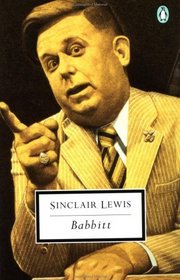Helpful Score: 2
Babbitt
Sinclair Lewis
Was Sinclair Lewis a wise and witty observer of the American Middle Class of the 1920s as hordes of pundits would have it; or was he merely another one of those wordsmiths, like the 'vicious circle' of the Algonquin Roundtable, who make their mark by pointing cruel fingers at those unlike themselves? His contributions to the body of distinctly American Literature cannot be denied given Main Street (1920), which depicts the American small town as a place of pettiness and hypocrisy; his attack on the charlatanism and incompetency of the medical profession in Arrowsmith (1925); or his send-up of evangelical Christianity in Elmer Gantry (1927), but to my way of thinking his finest work was the creation of his new American stereotype, George F. Babbitt (1922). A total conformist carried along by the tide of business and boosterism in the cities which grew out of the Main Streets of this country, Babbitt seems to have been so true a portrait of the American psyche its echoes resound even today in the illusory boom years of Reagan/Bush and the resultant economic instability and social entrenchment that linger with us here in the 21st Century. In the words of James M. Hutchinson, one of Lewis biographers, it was in Babbitt that Lewis showed Americans who they were -- and are.
Sinclair Lewis
Was Sinclair Lewis a wise and witty observer of the American Middle Class of the 1920s as hordes of pundits would have it; or was he merely another one of those wordsmiths, like the 'vicious circle' of the Algonquin Roundtable, who make their mark by pointing cruel fingers at those unlike themselves? His contributions to the body of distinctly American Literature cannot be denied given Main Street (1920), which depicts the American small town as a place of pettiness and hypocrisy; his attack on the charlatanism and incompetency of the medical profession in Arrowsmith (1925); or his send-up of evangelical Christianity in Elmer Gantry (1927), but to my way of thinking his finest work was the creation of his new American stereotype, George F. Babbitt (1922). A total conformist carried along by the tide of business and boosterism in the cities which grew out of the Main Streets of this country, Babbitt seems to have been so true a portrait of the American psyche its echoes resound even today in the illusory boom years of Reagan/Bush and the resultant economic instability and social entrenchment that linger with us here in the 21st Century. In the words of James M. Hutchinson, one of Lewis biographers, it was in Babbitt that Lewis showed Americans who they were -- and are.




![header=[] body=[Get a free book credit right now by joining the club and listing 5 books you have and are willing to share with other members!] Help icon](/images/question.gif?v=90afaeb39)
